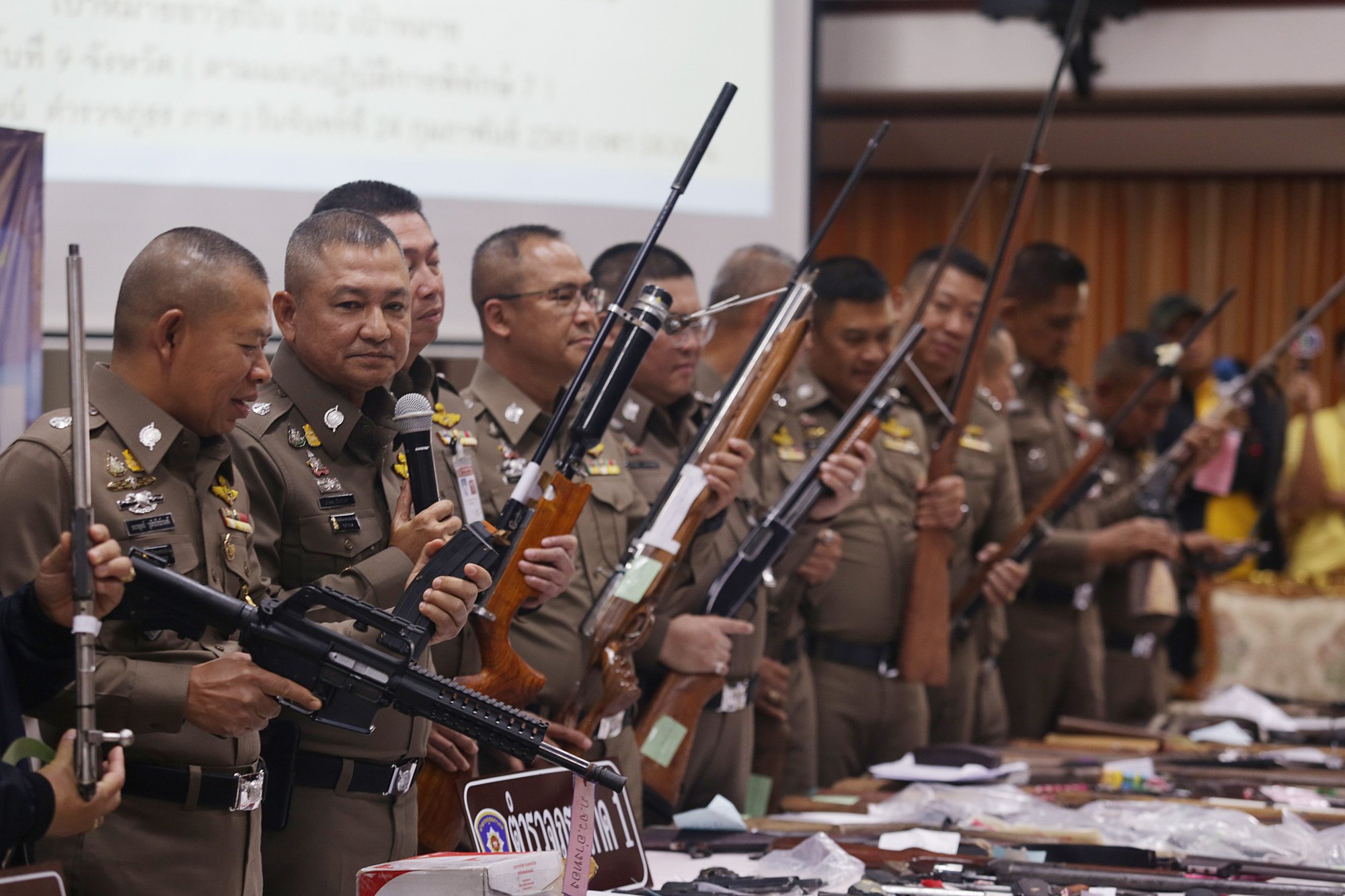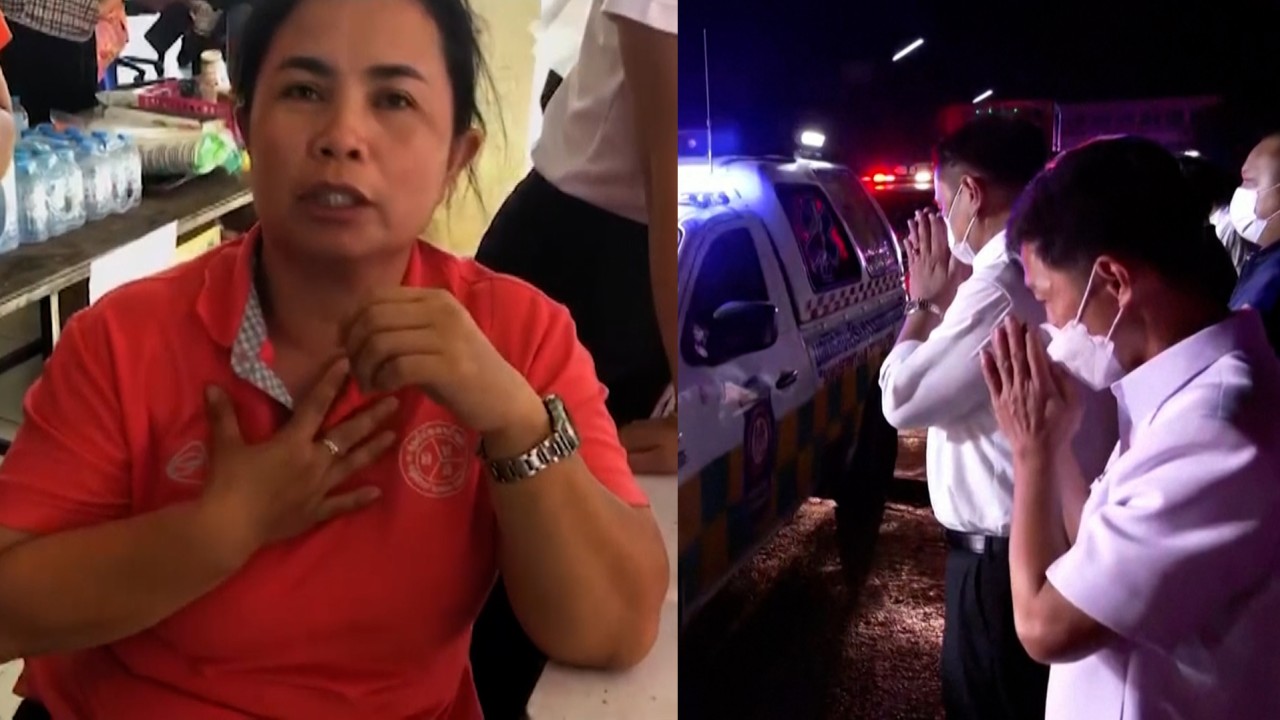
Guns, drugs and domestic violence: Thailand mass shooting puts spotlight on frail support systems
- A gunman, who was sacked from the police force over drug use, stormed a nursery in Nong Bua Lam Phu province on Thursday killing 36 people
- Experts say there is an urban-rural divide in drug treatment services in a country awash with guns, and the kingdom’s domestic violence crisis centres need urgent reforms
Former police officer Panya Khamrab stormed a nursery in northeastern Nong Bua Lam Phu province on Thursday killing 36 people, mostly children, before murdering his wife and young son and taking his own life.
Police said the gunman was sacked from the force over drug use – and had an addiction to yaba, a methamphetamine in pill form.
Health experts say meth use can lead to paranoia, hallucinations and violent behaviour and those withdrawing can experience psychosis.
Thai King Maha Vajiralongkorn visits wounded survivors of nursery shooting
Rehabilitation psychologist Shaowpicha Techo said there is an urban-rural divide in drug treatment services and harm reduction programmes.
While it can be easy for drug users to find help for addiction in the capital Bangkok and other cities, access is much more difficult in rural areas.
The kingdom also has a shortage of mental health professionals, Shaowpicha said, while a stigma around mental illness and drug use discourages some from seeking support.
“In Thailand, most people don’t talk about psychology or mental health … if someone has a problem … [they are labelled] a crazy person,” he said, adding that some turn to drugs instead of seeking treatment.
Contradicting this stereotype of Thailand being the land of smiles and people being kind … Thailand is a very violent country
Thai culture prizes avoiding confrontation and overt displays of anger, said Bangkok-based security expert Anthony Davis.
“As a consequence personal grievances and perceived loss of face are often suppressed to a point when they explode in lethal violence, typically in the context of angry males,” he said.
“This syndrome is exacerbated within the security services given a necessarily more disciplined and hierarchical environment than in society at large where sometimes rank and privilege can be abused.”
This environment together with easy access to firearms makes for a dangerous mix, Davis said.
“Contradicting this stereotype of Thailand being the land of smiles and people being kind … Thailand is a very violent country,” violence expert Janjira Sombatpoonsiri of Chulalongkorn University said.
The day of the massacre began with the gunman arguing with his wife at 4am, according to national police chief Damrongsak Kittiprapat, and ended when he shot her and their son before taking his own life.
According to the Office of the National Economic and Social Development Board, there were 2,177 domestic violence cases last financial year in a country with a population of 70 million.
But this is thought to be an underestimate as cases in Thailand are widely under-reported.
Thailand has legalised cannabis, now it needs to weed out the loopholes
Campaigner and lawyer Busayapa Srisompong who founded SHero, an organisation providing pro bono legal aid to victims, said the tragedy was a wake-up call.
“Patriarchal culture and toxic masculinity is so ingrained in certain institutions and … normalises and allows certain kinds of violent behaviour,” she said.
All Thai provinces are supposed to have a one-stop domestic violence crisis centre at government-run hospitals but not all of them are operational, Busayapa said
There are also domestic violence protection divisions under the Ministry of Social Development and Human Security but many are understaffed, under-resourced and personnel are poorly trained, Busayapa added.

Priority is often given to preserving a family unit at the expense of protecting vulnerable women and children, she said.
“There’s a culture within the police institution … when they see domestic violence or intimate partner violence cases they tend to think ‘oh they are going to get back together … [we will] mediate’,” Busayapa said.
She said many of the women she helped have tried to report their cases multiple times and called a special hotline but struggled to get help.
“If the community had access to mental health services that were trauma-informed and not victim blaming it could prevent a lot of [tragedies],” she said.

.png?itok=arIb17P0)
